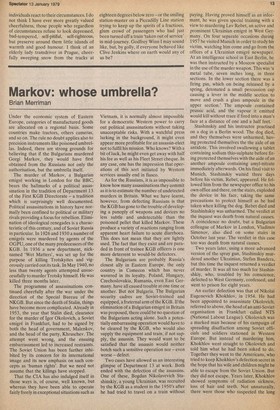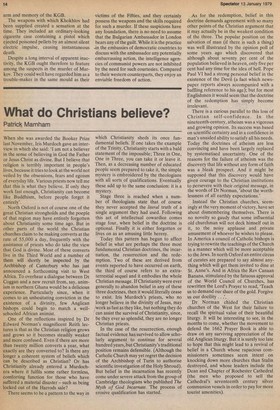Markov: whose umbrella?
Brian Merriman
Under the economic system of Eastern Europe, categories of manufactured goods are allocated on a regional basis. Some countries make tractors, others cameras, and so on. The rule no doubt applies also to precision instruments like poisoned umbrellas. Indeed, there are strong grounds for believing that if the Bulgarians murdered Gorgi Markov, they would have first obtained from the Russians not only the authorisation, but the umbrella itself.
The murder of Markov, a Bulgarian emigre working in London for the BBC, bears the hallmarks of a political assassination in the tradition of Department 13 of the First KGB Directorate — a tradition which is surprisingly well documented. Political assassinations in history have normally been confined to political or military rivals providing a focus for rebellion. Elimination of ideological renegades is a characteristic of this century, and of Soviet Russia in particular. In 1926 and 1930 a number of emigres were murdered by agents of the OGPU, one of the many predecessors of the KGB. In 1936 a new department, nicknamed 'Wet Matters', was set up for the purpose of killing Trotskyites and vigorously carried out its task. In May 1940, no less than twenty agents attempted unsuccessfully to murder Trotsky himself. He was killed three months later.
The programme of assassinations continued cheerfully after the war under the direction of the Special Bureau of the NKGB. But since the death of Stalin, things have become more complicated. Already in 1953, the year that Stalin died, clearance for the murder of Igor Okolovich, a Soviet emigre in Frankfurt, had to be signed by both the head of government, Malenkov, and the head of the party, Khruschev. The attempt went wrong, and the ensuing embarrassment led to increased restraints. The Soviet Union has been further inhibited by its concern for its international image and its new emphasis on such concepts as 'human rights'. But we need not assume that the killings have stopped.
That the CIA has also indulged itself in those ways is, of course, well known, but whereas they have been able to operate fairly freely in exceptional situations such as Vietnam, it is normally almost impossible for a democratic Western power to carry out political assassinations without taking unacceptable risks. With a watchful press lurking in the background, it might even appear more profitable for an assassin-elect not to fulfil his mission. Who knows? With a bit of luck, he might even get away with half his fee as well as his Fleet Street cheque. In any case, one has the impression that operations of this sort initiated by Western services usually end in fiasco.
As for the Russians, it is as impossible to know how many assassinations they commit as it is to estimate the number of undetected murders in Britain. What we have learnt, however, from defecting Russians is that the KGB has gone to the trouble of developing a panoply of weapons and devices no less subtle and undetectable than the poisoned pellet that killed Markov. These produce a variety of reactions ranging from apparent heart failure to acute diarrhoea. This does not mean that they are lightly used. The fact that they exist and are paraded in front of trainee KGB officers is one more deterrent to would-be defectors.
The Bulgarians are probably Russia's closest ally in Eastern Europe, the only country in Comecon which has never wavered in its loyalty. Poland, Hungary, Czechoslovakia, Rumania, even East Germany, have all caused trouble at one time or another. But not Bulgaria. The Bulgarian security cadres are Soviet-trained and equipped, a fraternal arm of the KGB. If the elimination of a Bulgarian emigre in Britain was proposed, there could be no question of the Bulgarians acting alone. Such a potentially embarrassing operation would have to be cleared by the KGB, who would also supply the equipment and train, if not supply, the assassin. They would want to be satisfied that the assassin would neither botch such a sensitive operation nor — even worse — defect.
Two cases have allowed us an interesting glimpse of Department 13 at work. Both ended with the defection of the assassins. One of these, Bogdan Nikolavevich Stashinskiy, a young Ukrainian, was recruited by the KGB as a student in the 1950's after he had tried to travel on a train without paying. Having proved himself as an informant, he was given special training with a view to murdering Lev Rebet, an active and prominent Ukrainian emigre in West Germany. On four separate occasions during 1957 he visited Munich in order to study his victim, watching him come and go from the offices of a Ukrainian emigre newspaper. At an intelligence school in East Berlin, he was then instructed by a Moscow specialist in the use of the murder weapon. This was 'a metal tube, seven inches long, in three sections. In the lower section there was a firing pin, which on being released by a spring, detonated a. small percussion cap causing a lever in the middle section to move and crush a glass ampoule in the upper section.' The ampoule contained prussic acid, and the vapour it emitted would kill without trace if fired into a man's face at a distance of one and a half feet.
Stashinskiy and his instructor practised on a dog in a Berlin wood. The dog died, and they themselves were unharmed, having protected themselves the the aide of an antidote. This involved swallowing a tablet containing sodium thio-sulphate before firing protected themselves with the aide of an another ampoule containing amyl-nitrate immediately afterwards. On his final visit to Munich, Stashinskiy waited three days before his victim, Rebet, appeared. He followed him from the newspaper office to his own office and there, on the stairs, exploded the device in his face, taking the same precautions to protect himself as he had taken when killing the dog. Rebet died and Stashinhskiy was unharmed. The verdict at the inquest was death from natural causes. A coincidence no doubt, but a Bulgarian colleague of Markov in London, Vladimiv Simenov, also died on some stairs in October last year. The verdict in this case too was death from natural causes.
Two years later, using a more advanced version of the spray gun, Stashinskiy murdered another Ukrainian, Stefan Bandera, but this time the inquest returned a verdict of murder. It was all too much for Stashinshkiy, who, troubled by his conscience, defected to West Germany, confessed, and Went to prison for eight years.
An earlier defection was that of Nikolai Eugenevich Khokhlov, in 1954. He had been appointed to assassinate Okolovich, referred to above, the head of an anti-Soviet organisation in Frankfurt called NTS (National Labout League). Okolovich was a marked man because of his campaign of spreading disaffaction among Soviet officials and soldiers stationed in Western Europe. But instead of murdering him, Khokhlov went straight to Okolovich and told him what he had been asked to do. Together they went to the Americans, who tried to keep Khokhlov's defection secret in the hope that his wife and children might be able to escape from the Soviet Union. But they did not escape. Years later, Khokhlov showed symptoms of radiation sickness, loss of hair and teeth. Not unnaturally, there were those who suspected the long arm and memory of the KGB.
The weapons with which Khokhlov had been supplied created a sensation at the time. They included an ordinary-looking cigarette case containing a pistol which ejected poisoned pellets by an almost silent electric impulse, causing instantaneous death.
Despite a long interval of apparent inactivity, the KGB ought therefore to feature among the suspects in the murder of Markov. They could well have regarded him as a trouble-maker in the same mould as their victims of the Fifties, and they certainly possess the weapons and the skills required for such a murder. If these suspicions have any foundation, there is no need to assume that the Bulgarian Ambassador in London bears any of the guilt. While it is the practice -in the embassies of democratic countries to discuss with the ambassador any potentially embarrassing action, the intelligence agencies of communist powers are not inhibited by the need for such courtesies. Compared to their western counterparts, they enjoy an enviable freedom of action.



































 Previous page
Previous page